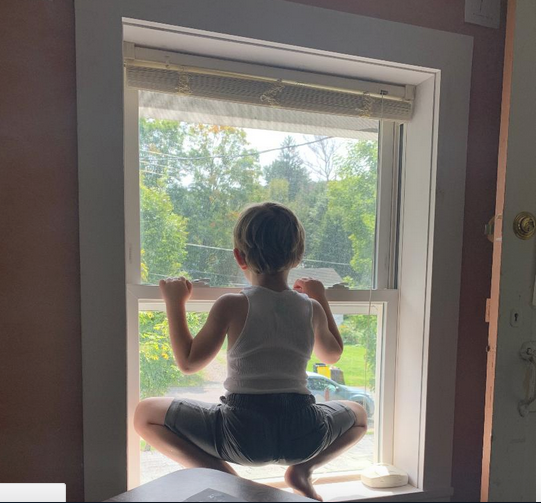It was time for Ralph’s first real haircut. Ralph’s mother said it was time, as did the next-door parents of his best friend, Emmitt. The only person who did not think it was time for a real haircut was Ralph. He did not want to go to the barbershop.
Ralph liked having his mother cut his hair. Last month she was so tired after working a double shift at the hospital she accidentally sliced his ear with the scissors. There was a lot of blood. On Sunday Mother announced that Bright’s Barber Shop had finally opened after being closed for nearly four months because of the virus. She scheduled an appointment for Ralph on Friday.
Thursday night Ralph could not fall asleep. Every time he shut his eyes all he could see was the huge window in front of Mr. Bright’s barbershop. Ralph hated that window. He had to pass it every week when his mother took him to the babysitter before she went to work at St. Ann’s Medical Center.
Even though Ralph hated the window, he would always look inside as he passed by. He couldn’t help himself. And what he saw truly frightened him. A large bald-headed man with a bushy moustache named Mr. Bright was always chopping off somebody’s hair. Ralph remembered seeing men, boys, and even a lady tied to a chair, looking like prisoners as Mr. Bright danced around them waving sharp tools. Friday morning Ralph was very very nervous and refused to leave the house. He felt as trapped as the frogs he stalked, caught and tossed into his pail. For the first time in his life Ralph wished he were a frog. Frogs don’t have hair.
Story by Mark Blickley, Photography by Beatrice Georgalidis
Mark Blickley and Beatrice Georgalidis
What is the significance of this work to you?
Mark Blickley: The lad in this ekphrasis photo is a highly creative 5 year-old, Charlie Georgalidis, who I am extremely fond of. I did a previous pandemic ekphrasis collaboration with him and his mother Beatrice where he was the photographer and she was the model, “Gravity Ungrateful.” This work marks the second time this mother/son team has jolted me out of my creative inertia during the Covfefe-19 crisis.
Beatrice Georgalidis: My son Charlie, age five, is featured in the photo, crouched in the window of my office at Bright Hill Press in the Catskills of New York State, during the thick of quarantine, as I snapped the shot from my desk while working/home schooling.
What is the significance of the form you chose for this work?
Mark Blickley: For the past 6 years, I have been working heavily with ekphrasis writing collaborations with visual artists in many mediums, using the literary genres of fiction, nonfiction, drama and poetry. As I define myself as a playwright, I love the collaborative nature of ekphrasis work that clearly echoes the collaborative work essential to participating in theater as a dramatist.
Beatrice Georgalidis: I’m a professional photographer by trade.
What was your process for creating this work?
Mark Blickley: I simply looked at the photo and the image of Charlie as a trapped frog immediately leapt to mind, so I knew I wanted to create a piece that in some way incorporated a frog motif alongside childhood fear.
Beatrice Georgalidis: Quarantine — stressed — took a break, and snapped a shot of my boy innocently playing while pandemic raged.
Mark Blickley is a widely published author of fiction, nonfiction, poetry, and drama. Blickley is a proud member of the Dramatists Guild and PEN American Center whose most recent book is a text-based art collaboration with fine arts photographer Amy Bassin, 'Dream Streams'. (Clare Songbirds Publishing House).
Beatrice Georgalidis is the executive director of New York's Bright Hill Press, a literary art center and gallery. She has worked for more than twenty years in film and television as a writer, producer, and videographer for many companies including Sundance Channel, MTV, VH1.
Next (Excerpt from “The Easter Meal Reveal”) >
< Back (Heads (Visual Art))
